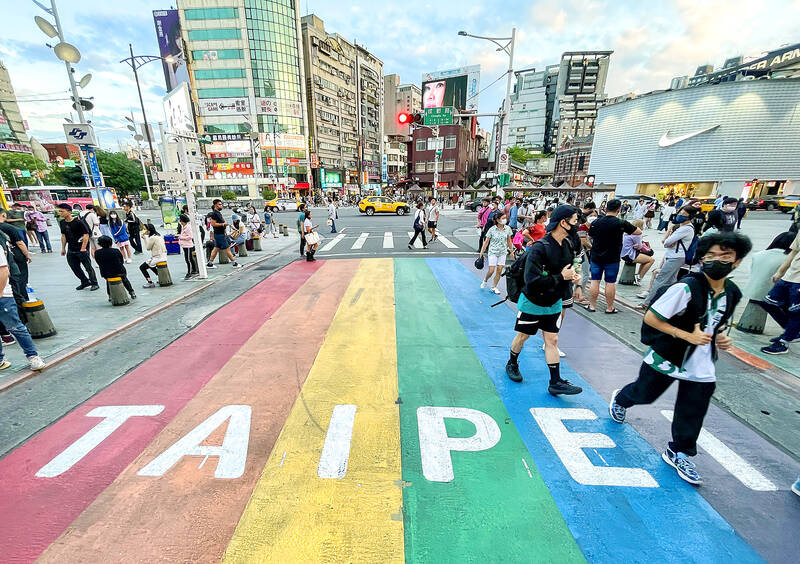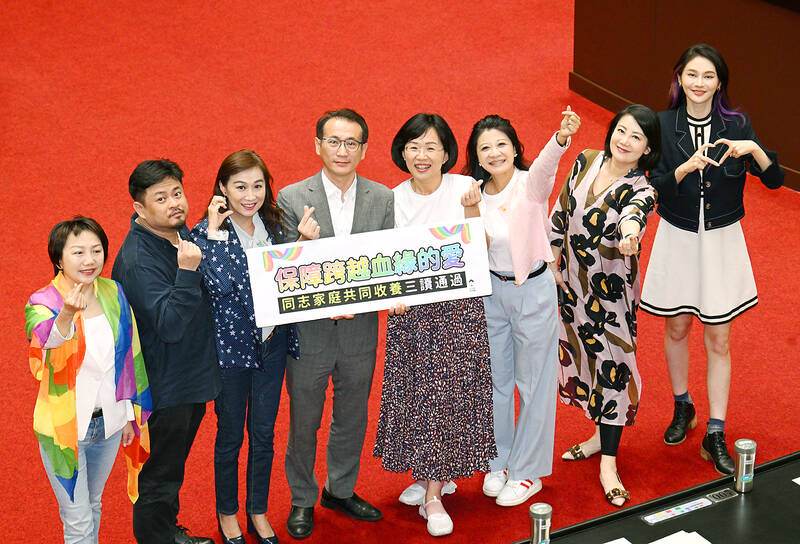The Legislative Yuan yesterday passed amendments to allow same-sex married couples to jointly adopt children that neither spouse is related to.
The amendments to the Act for Implementation of Judicial Yuan Interpretation No. 748 (司法院釋字第七四八號解釋施行法), which officially legalized same-sex marriage on May 19, 2019, seek to allow for the adoption of children who are not biologically related to the couple.
Since it was enacted, many LGBTQ advocates have sought to amend Article 20, which states that when one party to the union “adopts the genetic child of the other party,” the provisions concerning adoption in the Civil Code would apply.

Photo: CNA
In practice, the wording has excluded those in same-sex marriages from adopting children who are not biologically related to them.
Last year, lawmakers from all four parties in the legislature proposed amendments to the article, and after interparty negotiations, passed a final version of the revisions.
The updated version of Article 20 removes the “genetic child” language, stating that the Civil Code adoption provisions apply when one party to the union “adopts the child of the party, or where the couple jointly adopt a child.”

Photo: Tien Yu-hua, Taipei Times
Taiwan Alliance to Promote Civil Partnership Rights secretary-general Chien Chih-chieh (簡至潔) said that she was “overjoyed” at the law’s passage, which would allow same-sex couples to build “complete” families.
In the past, same-sex couples had to jump through a complex set of legal hoops to adopt a child, such as by divorcing, then having one party adopt a child, and then remarrying and raising the child together, Chien said.
Even then, the other party in the marriage could not formally adopt the child, since the child was not genetically related to their partner, she said.
The Ministry of Health and Welfare said that with the amendments’ passage, it would begin allowing same-sex couples to adopt “based on the current standard procedures.”

INVESTIGATION: The case is the latest instance of a DPP figure being implicated in an espionage network accused of allegedly leaking information to Chinese intelligence Democratic Progressive Party (DPP) member Ho Jen-chieh (何仁傑) was detained and held incommunicado yesterday on suspicion of spying for China during his tenure as assistant to then-minister of foreign affairs Joseph Wu (吳釗燮). The Taipei District Prosecutors’ Office said Ho was implicated during its investigation into alleged spying activities by former Presidential Office consultant Wu Shang-yu (吳尚雨). Prosecutors said there is reason to believe Ho breached the National Security Act (國家安全法) by leaking classified Ministry of Foreign Affairs information to Chinese intelligence. Following interrogation, prosecutors petitioned the Taipei District Court to detain Ho, citing concerns over potential collusion or tampering of evidence. The

‘FORM OF PROTEST’: The German Institute Taipei said it was ‘shocked’ to see Nazi symbolism used in connection with political aims as it condemned the incident Sung Chien-liang (宋建樑), who led efforts to recall Democratic Progressive Party (DPP) Legislator Lee Kun-cheng (李坤城), was released on bail of NT$80,000 yesterday amid an outcry over a Nazi armband he wore to questioning the night before. Sung arrived at the New Taipei City District Prosecutors’ Office for questioning in a recall petition forgery case on Tuesday night wearing a red armband bearing a swastika, carrying a copy of Adolf Hitler’s Mein Kampf and giving a Nazi salute. Sung left the building at 1:15am without the armband and apparently covering the book with a coat. This is a serious international scandal and Chinese

Seventy percent of middle and elementary schools now conduct English classes entirely in English, the Ministry of Education said, as it encourages schools nationwide to adopt this practice Minister of Education (MOE) Cheng Ying-yao (鄭英耀) is scheduled to present a report on the government’s bilingual education policy to the Legislative Yuan’s Education and Culture Committee today. The report would outline strategies aimed at expanding access to education, reducing regional disparities and improving talent cultivation. Implementation of bilingual education policies has varied across local governments, occasionally drawing public criticism. For example, some schools have required teachers of non-English subjects to pass English proficiency

TRADE: The premier pledged safeguards on ‘Made in Taiwan’ labeling, anti-dumping measures and stricter export controls to strengthen its position in trade talks Products labeled “made in Taiwan” must be genuinely made in Taiwan, Premier Cho Jung-tai (卓榮泰) said yesterday, vowing to enforce strict safeguards against “origin laundering” and initiate anti-dumping investigations to prevent China dumping its products in Taiwan. Cho made the remarks in a discussion session with representatives from industries in Kaohsiung. In response to the US government’s recent announcement of “reciprocal” tariffs on its trading partners, President William Lai (賴清德) and Cho last week began a series of consultations with industry leaders nationwide to gather feedback and address concerns. Taiwanese and US officials held a videoconference on Friday evening to discuss the